
In my single, young adult life St. Patrick’s Day was the biggest excuse for a party of the year. I’d dust off the green and tweed and trot out the Irish ancestry (William Taylor, the ship Earl of Donegal, County Antrim, etc., etc., etc.), and purchase large quantities of the chosen poison for the evening, whether Jamison, Guinness, Bailey’s, or some green concoction. It didn’t help that my usual partner in crime back then, Bob Donnan, celebrated his birthday on March 17. I remember a couple of particularly epic parties (barely.) It was also about the only time I’d listen to Celtic music.
Fast forward a few decades and my St. Patrick parties are much less epic, if they occur at all. Since this year’s celebration was on a Saturday, there was the potential for more epicness. While the actual date was celebrated quietly, it was a weekend full of Irish music, including the good, bad, and ugly.
The week’s music started non-Irish. Wednesday I attended my first session with Bring Your Own Ukulele at Empire Ale. I mixed up the chords a couple of times, confusing them with either banjo or guitar chords, but I think I did OK. They had a good turnout for the session.
Thursday night was another first. This was the first meeting of the Turtle Jam group up at the Bellingham Folk School. It’s an outgrowth of the Slug Jam group with which I’ve played a few times. As one might expect from the name, this one is for those wanting to go a bit faster than Slug Jam speeds. Also, this group emphasizes learning tunes by ear, so music is not allowed.
There were several folks there that I knew from Slug Jam and other sessions. Fiddler Colleen Freeman led the group.
We did a mix of Irish, Scottish, and even Nordic and Appalachian tunes. There were a couple of lap dulcimer players there, so the old-time tunes fit right in.
The session went well with different ones suggesting various tunes. Colleen had sent out three tunes for us to learn, and afterwards several sent out suggestions for others they would like to learn. We were given homework to find a tune set to present to the group. Turtle Jam meets every other Thursday, so that gives me two weeks. We’ll see.
Friday I took my homework to heart. I’ve got a massive collection of online tunes as well as PDFs. It was a gorgeous day, so I hauled out just about every instrument I own (or, at least, half of them.) I had my banjo and a guitar, the accordion, melodica, and two tin whistles. I had something with which to work on melody as well as harmony. I enjoyed the accordion the most, and even managed to play the tunes with a chordal accompaniment. I’m hoping I didn’t annoy Laura and the neighbors too much.
Friday evening we had tickets to hear the Irish group Dervish play at McIntyre Hall in Mount Vernon. Several of my fellow musicians were from the different sessions. We had great seats. This photo is from a different performance I found online, but we had exactly the same view. I didn’t take any photos during the concert.
The group was amazing. There were six musicians – a piper, fiddler, mandolo, bouzouki, button accordion, and bodhran. Cathy Jordan played bodhran and percussion and was the lead singer. Her voice was absolutely captivating but sounded very familiar. I’m sure I’ve heard them before.
The level of musicianship was also incredible. I now understand why the Village Pizza session is considered a “slow” session because these guys were blazing fast. I recognized a couple of the tunes from their sets, but most were unfamiliar. It seemed like the concert was over far too early, but it was an absolute blast.
Thus inspired, on St. Patrick’s day proper I spent a good bit of the day learning more tunes. My keyboard had been in the shop so we made a trip out that way to retrieve it, then I spent more time playing. Our St. Pat’s day was a bit more laid back. Laura made excellent pot roast for dinner that we said was close enough to Irish stew. Our martinis had green olives, so we figured that was good enough. We did have dessert with green mint.
That was the good, now on to the ugly (and that’s not to imply that any of the other weekend events were bad, to complete the trilogy)…
Sunday afternoon rolled around and time for another Irish music session at the Littlefield Celtic Center in Mount Vernon. My last experience at one of these sessions was not very good. I felt completely lost. However, I’d practiced and had a great time at a couple of other sessions. I felt…better but not exactly confident. I told Laura that it felt like I hadn’t studied enough for a test. And that wasn’t too far from the truth.
At least there were more musicians than the last time. There were several fiddlers, three flute players, a guy with a button accordion, and my friend Laura, the bodhran player. My tin whistle instructor was playing whistles and concertina. I was the only guitarist. Again.
There was a HUGE audience this time. However, once again I felt completely lost. It was as if my mind blanked out completely. Even with tunes that I knew, for some reason I couldn’t get the chords. I don’t know that I’ve ever felt that uncomfortable. I think I got some outright glares from several of my fellow musicians, which made me feel even less confident. I made it about an hour and a half, but felt like leaving after the first 20 minutes.
I’ve had it. Really, I have. I’ve tried, but I just can’t get this. And I don’t know why this has to be so hard. I am a professional musician and a fairly decent guitar player. I’ve had absolutely no problems with the Scottish sessions and have thrived in those settings.
The problem is the incredible set of strictures set on an Irish music session. I tried Googling “Irish music session…” to find sessions I could attend back home and Auto-Complete’s first suggestion was “Irish music session etiquette.” There were TONS of hits.
It seems that this obsession with etiquette is primarily a USA phenomenon amongst those that strive for a Traditional Irish Music™ session. I found the best summaries of these sentiments on the AmeriCelt website.
As we just noted, in Ireland’s Capitol, Dublin, there are no written ‘rules’ for sessions. However, if you have ever attended an Irish session here in the USA you may have been surprised by the expanded expectations of the participants. With some Irish sessions, one might well wonder whether one has accidentally disturbed a private party, even though the gathering is in a public place like a public house (Pub) or restaurant!
…or, I might add, publicly announced in print and social media that it’s a session open to musicians.
The web page features commentary by several musicians. Shay Black is a guitarist who runs a session in Berkeley, CA, and specifically addressed some of the challenges facing rhythm players in TIM™ sessions. Here are some excerpts from his comments:
I am a guitar player and run an Irish session on a regular basis. It is an open session, which means open to anyone that wants to join in, provided they already know how to play Irish traditional music. There is an unsaid institutional knowledge in session etiquette, and I will attempt to give my take on it….
Irish music sessions are usually characterized by everybody playing lead, all the time. There actually is no traditional harmony, as Irish music does not have a history of rhythmic background structure per se, apart from some classical Carolan or harp tunes….
As rhythm players, we first need to be cognizant of the fact that very many Irish session players want NO rhythmic accompaniment. They can find it off-putting, intrusive, distracting, off-beat and often just plain wrong….
First off, know the tune. That last half-sentence is important. There is nothing worse than sitting beside someone who is a ‘noodler’. Noodling is trying to keep up (and failing) because others are playing faster, not knowing the tune and guessing at it, or if you are playing a lead instrument, playing ‘ad lib harmony’. Musicians love it if the guitar player plays ‘lead’, in that they are playing tunes like a mandolin or banjo player, i.e., keeping up and actually playing the notes of the tunes. Please, people, do not noodle. If you don’t know a tune or can’t keep up, don’t play. It spoils it for everyone. Do not guess chords.
Oohhhkaaay…But here’s a problem. There are thousands upon thousands of tunes with just as many variations. I know enough about music theory to figure out the chord progressions but I wouldn’t even try to play a tune if I didn’t know it.
In order to learn tunes I’ve tried to concentrate on several “set lists” – core tunes that should be in every TIM™ player’s repertoire. However, at most sessions the regular players want nothing to do with these core tunes. It’s like being asked to play “House of the Rising Sun”, “American Pie”, and “Freebird” over and over again. I get that. I had this made abundantly clear when I suggested the slip jig “The Butterfly” at a recent session. I might as well have requested Three Dog Night’s “Joy to the World.”
Barry Foy wrote a book entitled Field Guide to the Irish Music Session. On the same web page as the Shay Black commentary Foy was interviewed by AmeriCelt.
My book’s definition of ‘session’ was meant to encompass any non-concert gathering of Irish musicians, whether in a kitchen or at a pub or on a sandy beach, but some readers have taken it to refer strictly to pub sessions and have found fault in that.
So, Foy thinks these rules of etiquette apply anywhere?? WTF??? Continuing with his interview…
AmeriCeltic:
Many host restaurants and publicans describe these gatherings as ‘Irish jam sessions’ and the like. You disapprove?Barry Foy:
Irish music will be better off once people stop associating the word ‘jam’ with it in any way (assume that someone who does, knows very little about the music in the first place). That word is freighted with far too many associations with other musics, whose values and protocols are worlds apart from those of Irish trad, to suit this context.I’m 58 years old; I saw Jimi Hendrix play, and I can sing for you, note for note (God help us), Clapton’s solo from Cream’s live recording of Crossroads. So believe me, I know what a jam is, and this isn’t any such thing. You won’t show up at an Irish session and ‘jam’ to it any sooner than someone who has never picked up a spatula will walk into a kitchen and ‘jam’ an eggs Benedict (they’d probably try to put jam on it). I definitely prefer to trust the experts when it comes to Sunday brunch-why should I want any less from Irish music?
AmeriCeltic:
So, the target audience of your book is those who carry a musical instrument into a session unaware of what to expect?Barry Foy:
It’s worth asking where anyone gets the notion that he can saunter in on a spell of music making by devoted, diligent players of a particular music and essentially try to remake it in his own image, on the spot. Try as I might, I’ve never been able to answer that question. The fact is, Irish music, like any handed-down music, is full of strictures and borders and prohibitions, and it signals its distinctive identity by treading a finite number of well-worn paths. That scenario won?t appeal to everyone; some may find it inhibiting, a threat to their self-expressive impulse. Luckily, the world is large, and there’s likely some other form of music that would suit those people better. If so, the players of Irish trad welcome them to pursue that other music, and we promise not to impose our own standards on it. In the meantime, we’ll try to make the most of our sometimes limited opportunities to play this music in the way we learned to play it, and have a good time doing it.I guess if I had to pick one sentence from Field Guide to the Irish Music Session that matters most, it would be this, from page 52: ‘The fact that you are holding a musical instrument in your hands at a session does not automatically entitle you to play it.’
So, according to Foy only “experts” should play in sessions. Right.
That leaves me to figure out my options. First, the Irish sessions at Littlefield and Honey Moon Mead are out. If I feel that uncomfortable at those sessions I have no business there and it’s not worth my time and the headaches. I think I’m also done with ultra-slow sessions like the Slug Jam, and maybe even the Turtle Jam. These progress too slowly for me and I get frustrated. For now the Irish session at Village Pizza is doable, and only one person scowled at me (and was one of the ones who scowled at the most recent Littlefield session.)
I’ll continue to practice the tunes as I’ve always done, both on rhythm and melodic instruments. I’ll finish out my tin whistle lessons. I will keep playing with the Scottish group and practice sessions. I’ll keep searching for sessions where I can join in comfortably and have fun. I will avoid TIM™ snobs that tend to suck the fun out of everything. Let them keep to those that have memorized the liturgy.
Fortunately (or, perhaps, unfortunately), I only have a few more months out here. The comfort-level discovery process starts all over when I get home. Will those Irish sessions be just as snooty? Time will tell. Perhaps I’ll just get my friends and family together and start my own.
OK, rant over.
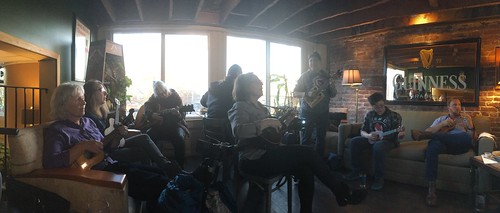
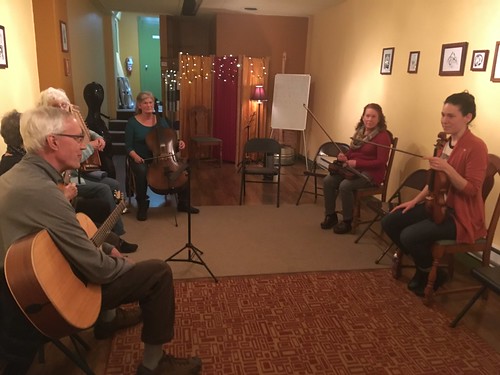
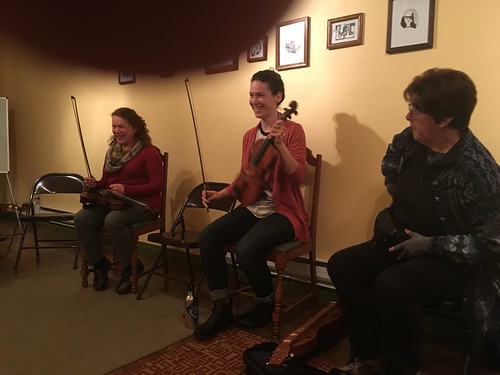

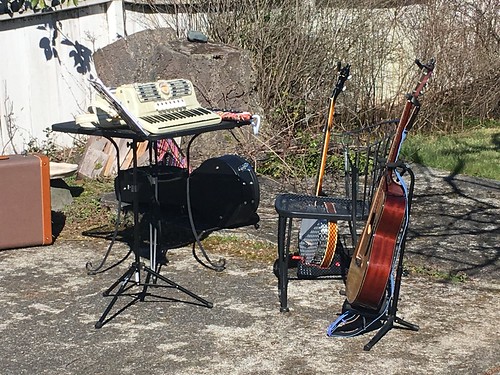
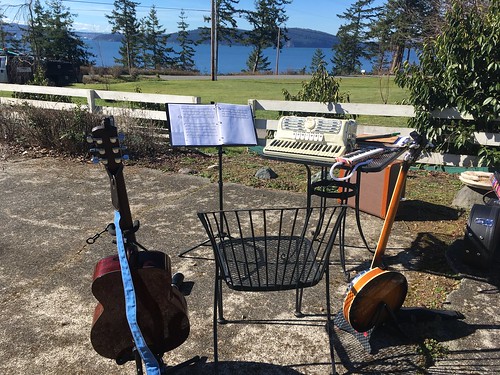
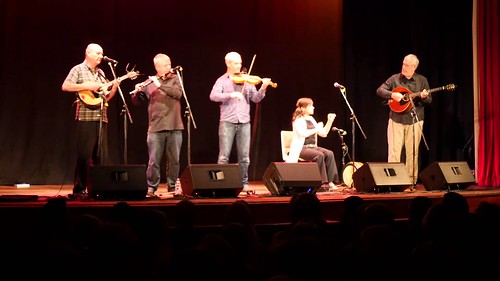
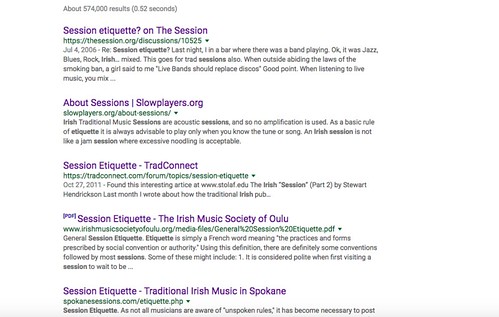

Bring out all your music makers to your gathering room at your home – I’ll join you in some rancorous, non-judgmental Irish music fun.